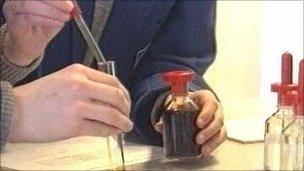Secondary school science has improved, says Ofsted
- Published

There was more outstanding science education at secondary level, inspectors said
The quality of science education in England's secondary schools has improved in the past three years, Ofsted inspectors say.
The scrapping of national tests in science has also led to more enjoyable lessons - and less learning by rote.
Attainment has risen at GCSE level, with more pupils taking separate sciences, inspectors said.
But a big increase in vocational science exams had prevented some pupils from taking the subject further.
Ofsted looked at science teaching in nearly 200 schools and colleges in England, based on inspection reports from 2007 to 2010. Schools said to be causing concern were excluded.
Inspectors said attainment at primary level had stayed broadly the same as in the previous few years, but had improved in secondary schools, with more teenagers getting higher grades at GCSE.
Last year, about 12,000 more students were awarded an A* or A at GCSE in each of the three sciences (chemistry, biology and physics) than in 2009, an increase of 24%.
Triple science
Course changes in 2006 had led to a big increase in students taking the three separate sciences (known as triple science) - which experts say is the best preparation for higher-level study.
From 2008 to 2009, there was a 24% increase in entries.
But an even bigger rise in the proportion taking vocational science tests (up 49%) meant some students were being short-changed, Ofsted suggested.
Vocational courses had helped to motivate students less suited to study academic courses, but were used "too extensively" in some schools, inspectors said.
"In a few schools, large proportions of students, or even the whole cohort, were entered for BTEC science, with an associated rise in GCSE-equivalence point scores for the schools," the report said.
"This approach meant that some students were not able to access the more academic courses that would have matched their ability and aptitude more effectively."
Innovative
In both primary and secondary schools, lessons had benefited from the scrapping in 2008 of national tests (known as Sats) in science, taken by 11 and 14-year-olds.
The Royal Society says good practical lessons are essential
This had led to fewer revision lessons and "freed teachers to be innovative in planning their teaching and in enriching the science curriculum".
The National Union of Teachers - which has campaigned against Sats - said Ofsted's report showed that English and maths tests taken by 11-year-olds should also be scrapped.
The inspectors said achievement in science was either good or outstanding in just over two thirds of the schools visited.
Teaching was at least good in about three quarters, with more outstanding teaching in secondary schools than in primaries.
Inspectors said some primary teachers lacked confidence in science and too few took up extra training in the subject.
Their findings echo some of the concerns raised by the Royal Society in its report on school science published last summer.
The body - which champions science in the UK - said too few primary teachers have a background in maths and science and that good practicals and investment in teacher training are essential to the development of scientists of the future.
Libby Steele, head of education at the Royal Society, said Ofsted's findings about improvements in secondary science education were welcome - but that the report also highlighted concerns.
"The Ofsted report recognises that, since 2006, the new suite of science qualifications has had some positive impact," she said.
"However the Royal Society remains concerned that some schools are not able to offer pupils the full range of options and thus students are not being given the opportunity to obtain the most suitable qualification for them."
- Published7 July 2010